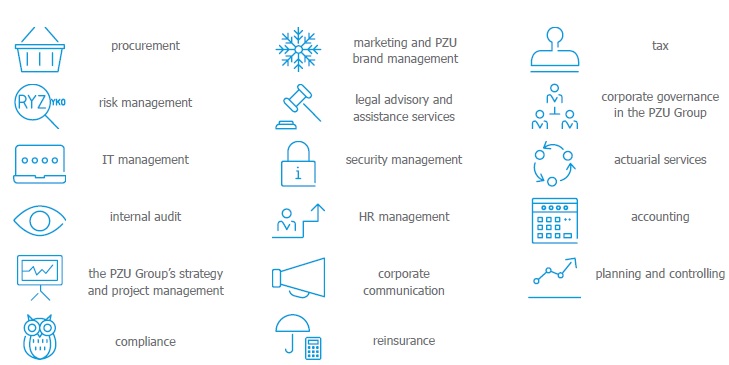PZU Group’s policies
Strategy






The PZU Group’s current shape is a consequence of the Group’s rapid growth, which gained additional momentum with PZU’s flotation on the Warsaw Stock Exchange (IPO in 2010). The core portion of the Group is composed of companies developed over a number of years through organic growth, namely PZU, PZU Życie, PTE PZU, TFI PZU, the slightly younger TUW PZUW and companies performing support functions (including PZU Pomoc, PZU CO and PZU Lab). In parallel, the PZU Group’s complementary development took the form of acquisitions. This is how the Group was enlarged by adding LINK4, healthcare companies focused around PZU Zdrowie, two large banking groups (Pekao, Alior Bank) and insurance companies from the Baltic states and Ukraine.
Using the Best Practices as the underlying material, further specific Management Policies were developed in key business areas. At first, they were implemented in the Group’s largest companies, namely PZU and PZU Życie, and then in other Group companies. In consideration of the scale of acquisitions in recent years, steps have been taken to better coordinate key processes and establish a system of the Group’s defining values to minimize compliance risk in each area. The objective was to create a system of values that would ensure seamless management of the whole Group while bearing in mind the local market’s specific nature and each company’s competitive advantages.
On 21 March 2017, an agreement was signed on the principles of cooperation within the PZU Group, the purpose of which was to work out uniform policies for the Group’s strategic areas across the board. The parties to this agreement were members of the Group (with the exception of Bank Pekao, Alior Bank and their subsidiaries) all of which undertook to cooperate with one another in specific areas at the PZU Management Board level. It was agreed that the PZU Group Policies would apply to all key business areas.
The steps that have been undertaken are reflected in the “New PZU” strategy which describes the methods of fulfillment of the clients’ future needs. The new PZU will offer various solutions in the fields of insurance, health, investment and banking, with the intention to assist the client in planning his/ her own future and that of his/her next of kin: from childbirth, education, first job, early independence period and setting up a family to retirement. This client-oriented and needs- oriented model assumes a shift away from thinking in terms of corporate product factories. The new PZU will operate as an advisory and service-oriented company, that is as one organism, while keeping up high standards in each area.
Uniform policies in the PZU Group

